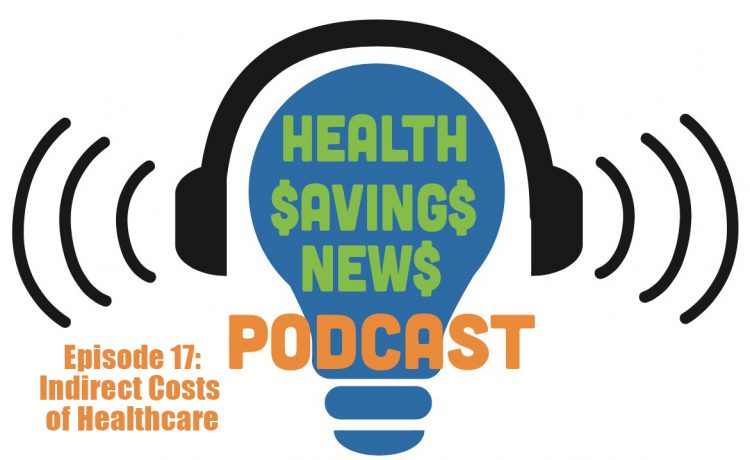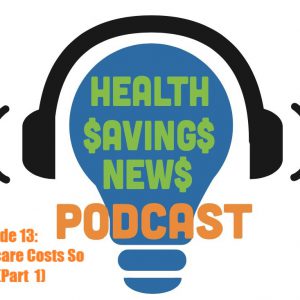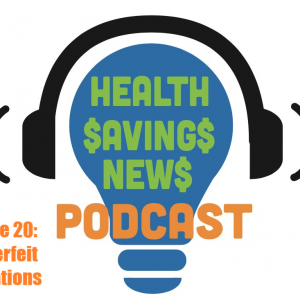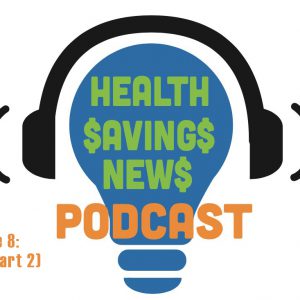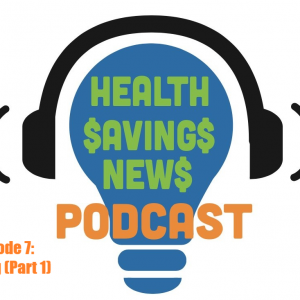Note: This is a rough transcript of episode 17 of Health Savings News and has been lightly edited for clarity. Copy may not be in its final form.
Evan (00:09):
Hello and welcome to Health Savings News, the podcast about healthcare costs in America, and how to save money on the often expensive care all kinds of people need. I’m your host, Evan O’Connor, joined by retired doctors Rich Sagall and Mike Woods. How are you guys doing today?
Mike:
Good.
Rich:
Doing well.
Evan:
Great. Each episode we discuss healthcare costs in America, offer tips for saving money, and relevant news that affects and reflects the expensive landscape of healthcare in America. This week’s topic is the indirect costs of healthcare. These include all costs not directly related to medical services. It’s really difficult to estimate how much these costs amount to, but they certainly have the potential to deter patients from seeking care as often as they need. While it is important to note that all patients can experience these indirect costs of care, low-income patients and other vulnerable people tend to confront them more often. We’ve already discussed the unnecessary medical costs in previous podcasts, such as a 2-part episode on why healthcare costs so much. Here are the necessary unavoidable costs totally separate from the medical care itself.
Mike (01:10):
Yeah, a good example of that is the effect that COVID has had on our lives. We’ve seen significant personal and financial costs of the COVID pandemic, and some of these are these hidden costs that we’ll be talking about. So a lot of people weren’t aware of a lot of these types of costs until COVID came around. So we thought this was a good time to show you what these costs may be and further how to help cut down on some of these costs.
Evan (01:40):
I would just want to push back a little bit on that, just that COVID-19 definitely made more people aware of them, but these are things that have affected people with chronic illnesses and disabilities forever in this country.
Mike (01:52):
Yeah, I was just giving the example that COVID made more people aware. That’s all I wanted to say.
Evan:
Totally.
Mike:
So…A lot of this should be recognized, but let me go through a fairly significant list of all the financial costs that can accompany illnesses and– but try to bear with me on this, and a lot of you will recognize how some of these things happen. I think the primary loss that a lot of people don’t consider is lost wages during illness. This happens both to the patient and a lot of your loved ones or friends who are helping to care or transport you or otherwise help with your healing process. So wages could be lost through absenteeism, meaning either you or your loved ones are voluntarily or involuntarily absent from work due to your illness. You may have a disability that persists after your illness that limits you or maybe even prevents you from working and earning your wage, illness associated with mortality that might otherwise have been prevented reduces further earnings that your family could have used. You lose wages when you spend time with your healthcare providers. Worse than that is the unnecessary waiting that happens when you’re in hospitals, healthcare providers and offices waiting rooms waiting for your turn. You also spend a lot of time on hold trying to make appointments, get follow ups, or other information you might exchange over the phone. And your loved ones or friends can also lose wages by sitting with or caring for you or even transporting you back and forth to various visits and hospitalizations.
Other expenses that are even more subtle that we all incur is travel costs, including mileage on your car, if you have to travel a distance for hospital care or other types of care you may have to pay for hotel or motel rooms, you may be eating meals away from home. You’ll definitely be paying parking fees at most medical facilities and gas to run your car, and in a lot of cases even tolls on highways to get there. A lot of these expenses could be even higher if your illness results in you not being able to drive, in if you do not have somebody else to drive you, you’ll need to spend money for taxis or other hired transportation.
While you’re sick and in the hospital, you may need to pay someone to take care of your children, but you may need someone to take care of some non-personal for home care chores such as shopping, snow removal, lawn care, even house cleaning. Sometimes when you are ill, you need some special aids around the house while you recover. That may or may not be permanent, such as mobility aids like ramps to your house, modifications to stairways and railings. You may also need modifications to automobiles to help you drive and other types of modifications that will accommodate your disability and illness. Some illnesses require special diets and supplements, a lot of which may not be covered by your healthcare insurance, and in a lot of cases these special diets and supplements are quite expensive. If you need over the counter products to help you get comfortable or otherwise recover. Most of those are not covered by healthcare insurance either. In situations such as hair loss from chemotherapy, you may need cosmetic things like wigs or scarves. You may need special clothing or sleeves for certain types of disabilities associated with appendages. A lot of times — you hear this over and over — how important exercise is to medical care, and indeed, it is very important to medical care and recovery from a significant number of cardiac problems. But a lot of times your healthcare will not pay for the gym or membership or healthcare equipment that will help you follow through with this exercise program. And finally, in a lot of cases, if you can no longer do your job because of your illness or disability, you may need some re-education or new job training — again — that may or may not be covered by your health insurance.
Rich (06:01):
I’d like to mention that there are programs available that can help with many of these costs that Mike was listing, and we list those on the NeedyMeds website under the diagnosis based assistance programs and looking at the list that he gave, there are programs, for example, that would help with wigs, that will help with preservation of hair so you don’t lose your hair and many, many other programs. So I strongly suggest people check these out.
Mike (06:24):
Yeah. There’s also listings for transportation at low cost.
Rich (06:27):
Besides travel expenses or our programs will help with housing if you have to travel or a family member has to travel with you a distance to get the care that you need.
Evan (06:37):
There is a wide variety of assistance available through the Diagnosis Based Assistance programs on the NeedyMeds website from travel expenses like you’re talking about, but also childcare, there’s food pantries, meal deliveries, there’s even programs that will help with just living expenses that will help you pay your rent.
Rich (06:55):
There are programs also that will provide dog walking and other pet care while you if you’re hospitalized.
Mike (07:02):
So NeedyMeds can help with a lot of those things. But there are other general costs of medical care that a lot of people don’t realize are passed indirectly back to you. For example, hospitals and testing sites use a high amount of energy, and that’s factored into the cost of going to a hospital. Hospitals and testing centers produce a huge carbon footprint because of this energy use, but there’s also a large environmental impact that revolves around disposing of waste and chemicals that are generated by many medical procedures and tests. And, again, cleaning up all this medical waste is a financial burden that generally will fall back on others. One of the interesting things to think about is impulse buys. Every time you’re in some place, you get the impulse to buy something. So the more often you have to go to the pharmacy or a hospital, the more tempted you will be to buy things in the pharmacy or the hospital gift shop. Now, there are some costs that are not financial and rich and Evan will discuss a lot of these because they are things that primarily affect patients personally.
Rich (08:17):
Well, a big one is when people are sick, they just don’t feel well. They may have pain, they may not be able to do what they’re used to doing. It may affect them emotionally in terms of depression. So these are all things that need to come into play and people should be aware of.
Evan (08:33):
The grief and stress of illness can have a huge mental health consequence. The depression and anxiety of how am I going to afford healthcare? How am I going to feed my family? The family’s healthcare, questions of how, what do we do if the person who makes the money is unable to work? It can add so much stress to the family and the individual on every level.
Rich (08:56):
That’s why I always say that illness is a family affair. It affects everyone. It may result, as you said, in financial issues. It may result in worsening health of other members of the family because they have to put off routine medical care or dental care or other healthy activities because of cost or just time available.
Mike (09:14):
Yeah. And being sick a lot of time will limit your ability to function and perform certain activities. It may reduce your autonomy, making you more reliant on others, and you certainly lose a lot of leisure time and opportunities for relaxation and vacationing, all of which again contribute significantly to life stress and poor quality of life.
Rich (09:40):
And it’s important for family members to know the course of the medical disease because they may need to be prepared for changes such as becoming less competent, more agitated, or other changes which change the sick person’s behavior from when it is normal to abnormal,
Evan (09:57):
Even in illnesses that don’t have a personality change component. If you are a caregiver for a family member, just knowing the things to watch out for to know if something’s going wrong or just being aware of all the different possible outcomes can just be very stressful in and of itself.
Rich (10:18):
And also to realize that sometimes mental changes do go away as the person gets better. So a common problem of elderly people in the hospital, particularly in the ICU, is sundowning. Whether you’re confused as the day, where they get more confused as the day goes on. And this tends to resolve once the person gets back to a normal lifestyle.
Mike (10:39):
Unfortunately, some elderly who are sick don’t get to return to a normal lifestyle, and it doesn’t improve as fast as it otherwise might have.
Rich (10:48):
Definitely. I’ve read of studies that looked at the death rate after senior medical illness and elderly people that do not have anything to do with the actual illness, and it’s pretty high.
Mike (10:59):
Well, having said all that, are there, are there things that you can do to help with some of these hidden or indirect costs associated with being ill? Well, we’ve gone over it and over in the past, but it still comes down to preventive healthcare in promoting health to reduce sick days. So much of the costs that we’re talking about can be avoided if there was just better control of preventable and controllable illnesses. Again, you know, not harping on COVID, but again, it’s a very good example of a significant amount of hidden costs that could have been avoided if the pandemic was handled differently. There are some evidence based wellness programs that most of them are disease specific. So they were evidence based wellness programs for obesity that combine diet, exercise, counseling that work. It’s if you need a combination, the right combination of all three in order to have an effect on obesity. But there are some evidence based programs that do work. Same thing with diabetes. There are some programs like that that do work. And there’s too many that don’t <laugh>.
Rich (12:16):
Some of the programs for, for example, I remember reading programs that offer gym membership. What they found is most of the people that took advantage of that were people that are going to the gym anyway and it didn’t get very many new people going. There have been a number of wellness programs that have been proposed. We believe that you should only participate in those that are evidence based and have studies to support the activities. It’s too easy to set up a simple program that sounds good, but not monitor the results and show that it actually provides a benefit.
Mike (12:46):
More medical research needs to be done to look at creating effective evidence based wellness programs to offset all of the programs that currently exist that probably are not effective, but are drawing people in huge numbers only to be disappointed by the outcomes.
Rich (13:03):
It really takes that personal commitment. I used to have patients that asked me whether they weigh too much, and I said, take a look at yourself in the mirror. If you’re happy with your weight, the way you look, no program is going to work. If you’re not happy, then there are programs that might work, but you have to make that commitment.
Mike (13:19):
Yeah, there’s a number of small things that we can sometimes do to cut down on some of this. For instance, we talked about problems with traveling costs and times and waiting rooms. But one of the things that we can do to improve that is increase the use of remote visits, which would cut down the amount of time traveling. I know when I have a yearly checkup, I have two separate visits, one for a blood test and one for the visit itself. Why do I need to go twice when both of those could be accomplished in the same visit. So try to talk your doctor into doing things like that is another way of doing it. I’m a little concerned about how profiteering that some of these hospitals seem to be off parking. I think more hospitals should have free parking rather than the huge amount that it will cost to park for a day or even for a few hours to visit a relative in the hospital. And as far as the personal costs of illness, too many people in the country are still reluctant to seek counseling for depression and anxiety. And I would encourage more people who are having these types of problems associated with illness to to seek some form of counseling or other help for their mental health issues associated with illness.
Evan (14:36):
As we’ve discussed, indirect costs often come in the form of lost wages for missing work, gas, and other transportation and travel costs — we didn’t even get into what people have to pay for public transportation if they just don’t have a car and have to travel long distances to their appointments — lodgings if appointments are far from home, meals in the road, healthy food at home, childcare, housekeeping and repairs, home and vehicle modifications, and clothes, sleeves, scarves, and wigs. So many of these barriers are related to the social determinants of health, which we’ll talk about in future episodes. But the best ways to address some of these problems are, as Mike said, increase use of telehealth to reduce travel costs and wait times. And NeedyMeds has a huge variety of resources under the Diagnosis Based Assistance database that provides health with so many of these indirect external healthcare costs. You can find all of our information for free at needymeds.org or call us toll-free at 1-800-503-6897.
In the last segment of each episode, we suggest some of the culture, art, entertainment, and social causes we’ve been engaged with to each other and our listeners. In the last episode I suggested folks donate to their local food pantries. This week, I’d like to give a shout out to an organization called FoodFinder. FoodFinder is a food pantry locator and 501(c)(3) nonprofit that shows you when and where to get free food assistance in your area. They have a map available on their homepage as well as a smartphone app where every pin that appears is a food assistance program nearby. If you or someone you know require food assistance this holiday season, point them to FoodFinder. You can find their information on a smartphone app or at foodfinder.us.
Thank you so much for listening to this episode of Health Savings News. Please subscribe, rate and review us on Apple Podcasts or wherever you’re listening to the show — it really does help. You can follow @Needy Meds on Facebook, Instagram, LinkedIn, YouTube. You can follow at @HealthSavinPod on Twitter (for as long as Twitter stays around) for updates specific to this podcast and send questions, comments, and topic suggestions to podcast@needymeds.org. Our music is composed by Samuel Rulon-Miller. His music can be found at musicisadirtyword.bandcamp.com. The Health Savings News podcast is produced by me, Evan O’Connor. All the sources we used in our research can be found in the episode’s podcast description on our website or your podcast app of choice. Health Savings News is not intended to substitute for professional medical, financial, or legal advice. Always seek the advice of a qualified healthcare professional, or appropriate professional with any questions. Views expressed on Health Savings News are solely those as the individuals expressing them. Any views expressed do not necessarily represent views in Health Savings News, other contributors, the NeedyMeds organization, or staff. Thanks again for listening. See you in two weeks with our next episode.
Sources:
https://patientengagementhit.com/news/confronting-indirect-patient-healthcare-cost-hurdles-sdoh
https://www.sciencedirect.com/topics/medicine-and-dentistry/cost-of-illness
https://academyhealth.org/sites/default/files/wvu_-_multimorbidity_and_indirect_costs_pdf.pdf
https://www.ncbi.nlm.nih.gov/pmc/articles/PMC4450688/
https://www.bcbs.com/the-health-of-america/reports/the-economic-impact-of-caregiving

